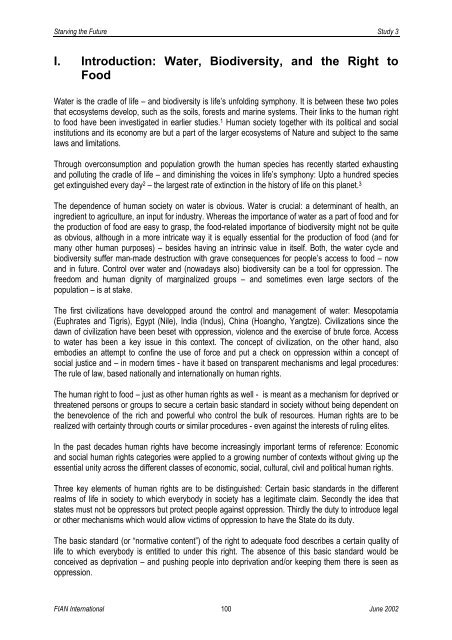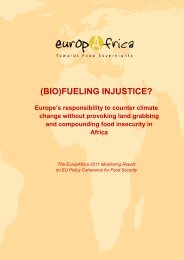Study 3: Ecodestruction and the Right to Food: The Cases of Water ...
Study 3: Ecodestruction and the Right to Food: The Cases of Water ...
Study 3: Ecodestruction and the Right to Food: The Cases of Water ...
Create successful ePaper yourself
Turn your PDF publications into a flip-book with our unique Google optimized e-Paper software.
Starving <strong>the</strong> Future <strong>Study</strong> 3<br />
I. Introduction: <strong>Water</strong>, Biodiversity, <strong>and</strong> <strong>the</strong> <strong>Right</strong> <strong>to</strong><br />
<strong>Food</strong><br />
<strong>Water</strong> is <strong>the</strong> cradle <strong>of</strong> life – <strong>and</strong> biodiversity is life’s unfolding symphony. It is between <strong>the</strong>se two poles<br />
that ecosystems develop, such as <strong>the</strong> soils, forests <strong>and</strong> marine systems. <strong>The</strong>ir links <strong>to</strong> <strong>the</strong> human right<br />
<strong>to</strong> food have been investigated in earlier studies. 1 Human society <strong>to</strong>ge<strong>the</strong>r with its political <strong>and</strong> social<br />
institutions <strong>and</strong> its economy are but a part <strong>of</strong> <strong>the</strong> larger ecosystems <strong>of</strong> Nature <strong>and</strong> subject <strong>to</strong> <strong>the</strong> same<br />
laws <strong>and</strong> limitations.<br />
Through overconsumption <strong>and</strong> population growth <strong>the</strong> human species has recently started exhausting<br />
<strong>and</strong> polluting <strong>the</strong> cradle <strong>of</strong> life – <strong>and</strong> diminishing <strong>the</strong> voices in life’s symphony: Up<strong>to</strong> a hundred species<br />
get extinguished every day 2 – <strong>the</strong> largest rate <strong>of</strong> extinction in <strong>the</strong> his<strong>to</strong>ry <strong>of</strong> life on this planet. 3<br />
<strong>The</strong> dependence <strong>of</strong> human society on water is obvious. <strong>Water</strong> is crucial: a determinant <strong>of</strong> health, an<br />
ingredient <strong>to</strong> agriculture, an input for industry. Whereas <strong>the</strong> importance <strong>of</strong> water as a part <strong>of</strong> food <strong>and</strong> for<br />
<strong>the</strong> production <strong>of</strong> food are easy <strong>to</strong> grasp, <strong>the</strong> food-related importance <strong>of</strong> biodiversity might not be quite<br />
as obvious, although in a more intricate way it is equally essential for <strong>the</strong> production <strong>of</strong> food (<strong>and</strong> for<br />
many o<strong>the</strong>r human purposes) – besides having an intrinsic value in itself. Both, <strong>the</strong> water cycle <strong>and</strong><br />
biodiversity suffer man-made destruction with grave consequences for people’s access <strong>to</strong> food – now<br />
<strong>and</strong> in future. Control over water <strong>and</strong> (nowadays also) biodiversity can be a <strong>to</strong>ol for oppression. <strong>The</strong><br />
freedom <strong>and</strong> human dignity <strong>of</strong> marginalized groups – <strong>and</strong> sometimes even large sec<strong>to</strong>rs <strong>of</strong> <strong>the</strong><br />
population – is at stake.<br />
<strong>The</strong> first civilizations have developped around <strong>the</strong> control <strong>and</strong> management <strong>of</strong> water: Mesopotamia<br />
(Euphrates <strong>and</strong> Tigris), Egypt (Nile), India (Indus), China (Hoangho, Yangtze). Civilizations since <strong>the</strong><br />
dawn <strong>of</strong> civilization have been beset with oppression, violence <strong>and</strong> <strong>the</strong> exercise <strong>of</strong> brute force. Access<br />
<strong>to</strong> water has been a key issue in this context. <strong>The</strong> concept <strong>of</strong> civilization, on <strong>the</strong> o<strong>the</strong>r h<strong>and</strong>, also<br />
embodies an attempt <strong>to</strong> confine <strong>the</strong> use <strong>of</strong> force <strong>and</strong> put a check on oppression within a concept <strong>of</strong><br />
social justice <strong>and</strong> – in modern times - have it based on transparent mechanisms <strong>and</strong> legal procedures:<br />
<strong>The</strong> rule <strong>of</strong> law, based nationally <strong>and</strong> internationally on human rights.<br />
<strong>The</strong> human right <strong>to</strong> food – just as o<strong>the</strong>r human rights as well - is meant as a mechanism for deprived or<br />
threatened persons or groups <strong>to</strong> secure a certain basic st<strong>and</strong>ard in society without being dependent on<br />
<strong>the</strong> benevolence <strong>of</strong> <strong>the</strong> rich <strong>and</strong> powerful who control <strong>the</strong> bulk <strong>of</strong> resources. Human rights are <strong>to</strong> be<br />
realized with certainty through courts or similar procedures - even against <strong>the</strong> interests <strong>of</strong> ruling elites.<br />
In <strong>the</strong> past decades human rights have become increasingly important terms <strong>of</strong> reference: Economic<br />
<strong>and</strong> social human rights categories were applied <strong>to</strong> a growing number <strong>of</strong> contexts without giving up <strong>the</strong><br />
essential unity across <strong>the</strong> different classes <strong>of</strong> economic, social, cultural, civil <strong>and</strong> political human rights.<br />
Three key elements <strong>of</strong> human rights are <strong>to</strong> be distinguished: Certain basic st<strong>and</strong>ards in <strong>the</strong> different<br />
realms <strong>of</strong> life in society <strong>to</strong> which everybody in society has a legitimate claim. Secondly <strong>the</strong> idea that<br />
states must not be oppressors but protect people against oppression. Thirdly <strong>the</strong> duty <strong>to</strong> introduce legal<br />
or o<strong>the</strong>r mechanisms which would allow victims <strong>of</strong> oppression <strong>to</strong> have <strong>the</strong> State do its duty.<br />
<strong>The</strong> basic st<strong>and</strong>ard (or “normative content”) <strong>of</strong> <strong>the</strong> right <strong>to</strong> adequate food describes a certain quality <strong>of</strong><br />
life <strong>to</strong> which everybody is entitled <strong>to</strong> under this right. <strong>The</strong> absence <strong>of</strong> this basic st<strong>and</strong>ard would be<br />
conceived as deprivation – <strong>and</strong> pushing people in<strong>to</strong> deprivation <strong>and</strong>/or keeping <strong>the</strong>m <strong>the</strong>re is seen as<br />
oppression.<br />
FIAN International 100<br />
June 2002
















